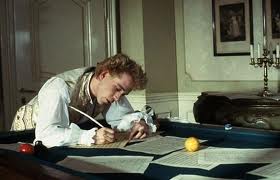In today’s Wall Street Journal drama column, I review two New York shows that are more than a bit off the beaten path of convention, Teller’s Play Dead and Paul Reubens’ The Pee-wee Herman Show. Here’s an excerpt.
* * *
Without spoiling any of its secrets, I can say that “Play Dead” is a slicked-up version of a good old-fashioned Saturday-night spook show in which Todd Robbins, Mr. Teller’s co-author and onstage alter ego, tells the more or less true stories of a serial killer, two phony mediums, a geek (look it up) and a murder victim whom Mr. Robbins knew in real life. During and in between these narratives, things…happen. The nature of these grisly occurrences can best be summarized by saying that the white suit worn by Mr. Robbins grows steadily redder throughout the evening.
 Seeing as how the creators of “Play Dead” are both veteran stage magicians, it stands to reason that you’ll see–or think you saw–some spectacular and seemingly inexplicable illusions, including the eating of a lightbulb and the murder of an audience member. But what really drives the show is the contempt in which its makers rightly hold those charlatans who use “magic” to defraud the public. The middle section of “Play Dead,” for instance, is a Houdini-like reenactment of a fake séance that is at one and the same time funny, furious and wholly enthralling….
Seeing as how the creators of “Play Dead” are both veteran stage magicians, it stands to reason that you’ll see–or think you saw–some spectacular and seemingly inexplicable illusions, including the eating of a lightbulb and the murder of an audience member. But what really drives the show is the contempt in which its makers rightly hold those charlatans who use “magic” to defraud the public. The middle section of “Play Dead,” for instance, is a Houdini-like reenactment of a fake séance that is at one and the same time funny, furious and wholly enthralling….
Unlikely as it may sound, it’s been 20 years since “Pee-wee’s Playhouse” went off the air, which means that the Broadway transfer of “The Pee-wee Herman Show” is above all a nostalgia act aimed at thirtysomethings who spent their Saturday mornings watching Paul Reubens’ cheerfully ironic take on children’s TV. Many such folk were present when I saw a press preview of the show last week, and they made their presence known, lustily cheering all their favorite bits. If you, too, were a fan, all you need to know is that Mr. Reubens, who is now 58, is still playing the part of a weirdly spritely man-child and that he has given us what is in essence a 90-minute-long stage version of his TV show, complete with talking furniture and peculiar playmates. Except for the superlative puppetry of Basil Twist, the main difference between Pee-wee then and now is that the script of “The Pee-wee Herman Show” is thickly larded with double entendres, jokes about gay marriage and other nudge-nudge-wink-wink nods to its now-grown fans….
* * *
Read the whole thing here.
Archives for November 12, 2010
TT: No, you can’t
 Are geniuses made, not born? I just read a new book called Sudden Genius? in which the British biographer Andrew Robinson offers an admirably balanced take on this controversial topic–far more balanced than the one to be found in Malcolm Gladwell’s Outliers, which comes dangerously close to arguing that genius doen’t exist at all. In my “Sightings” column for today’s Wall Street Journal, I compare and contrast these two points of view:
Are geniuses made, not born? I just read a new book called Sudden Genius? in which the British biographer Andrew Robinson offers an admirably balanced take on this controversial topic–far more balanced than the one to be found in Malcolm Gladwell’s Outliers, which comes dangerously close to arguing that genius doen’t exist at all. In my “Sightings” column for today’s Wall Street Journal, I compare and contrast these two points of view:
Andrew Robinson examines key moments in the lives of such giants as Marie Curie, Charles Darwin, Albert Einstein and Leonardo da Vinci. The conclusion that he draws from their experience is that creative genius is “the work of human grit, not the product of superhuman grace.” Along the way, Mr. Robinson also takes time out to consider one of the most fashionable modern-day theories of genius–and finds it wanting.
The theory is known in England as “the 10-year rule” and in the U.S., where it has been popularized by Malcolm Gladwell, the author of “Outliers,” as “the 10,000-hour rule.” The premise is the same: To become successful at anything, you must spend 10 years working at it for 20 hours each week. Do so, however, and success is all but inevitable. You don’t have to be a genius–in fact, there’s no such thing.
K. Anders Ericsson, the psychologist who is widely credited with having formulated the 10,000-hour rule, says in “The Making of an Expert,” a 2007 article summarizing his research, that “experts are always made, not born.” He discounts the role played by innate talent, citing Wolfgang Amadeus Mozart as an example….
The problem with the 10,000-hour rule is that many of its most ardent proponents are political ideologues who see the existence of genius as an affront to their vision of human equality, and will do anything to explain it away. They have a lot of explaining to do…
Read the whole thing here.
TT: Almanac
“The presence of irony does not necessarily mean that the earnestness is excluded. Only assistant professors assume that.”
Søren Kierkegaard, Concluding Unscientific Postscript to Philosophical Fragments
